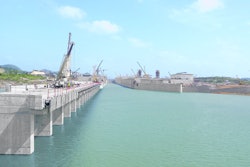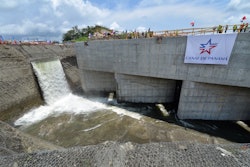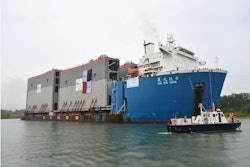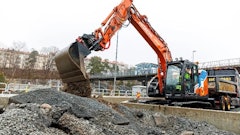Panama is currently pushing forward with a major project to build a third set of locks on the Panama Canal. The project aims to enable passage of larger container ships, particularly those carrying merchandise from Asia to the US East coast, through the 80 km waterway. Upon completion, 12,000-TEU (twenty foot equivalent unit) container ships will be able to pass through the Panama Canal annually, approximately three times larger than can pass through now.
Construction of the new Expanded Panama Canal
Work was originally due to be completed by October 2014, but a series of delays has led the Panama Canal Authority (Autoridad del Canal de Panamá: ACP) to push the delivery date back to December 2015. Delays to the project beyond this date remain likely. The cause of previous delays include a seven-month delay in 2011 over disagreements between the ACP and Grupo Unidos por el Canal (GUPC), the contractor of the third set of locks project, over cement quality; a two-week delay in February 2014 over cost overruns; and a two-week delay in June resulting from a labour strike staged by the National Union of Workers of Construction and Similar Industries (Sindicato único nacional de trabajadores de la industria de la construcción y similares: SUNTRACS).
Labor relations
One of the largest challenges relates to the ongoing problematic relations between labor unions and canal management. In addition to the aforementioned disruption, workers from the SUNTRACS union went on strike demanding a 20% pay increase earlier this year. The two-week strike at the canal ended in early May when GUPC agreed to an 11% wage increase in the first year, with further increases over the following three years.
However, labor relations remain strained to date. On 18 June, unions publicly criticised the management of Gabriel Ayú Prado, ACP's labour relations board president, and complained of political interference in salary discussions. Shortly after, the head of the ACP, Jorge Quijano, described the situation as "very delicate" after he faced criticism from four unions for failing to invite them to meetings with three other canal workers unions on 25 June. Such frequent, low-level disputes will negatively affect the effectiveness of conflict resolution mechanisms relating to the canal. In this context, it is likely to prove difficult for authorities to prevent further incidents of industrial action prior to the projected delivery date in December 2015, although this are unlikely to turn violent.
Project overspends
Another potential threat to the timely completion of the project would be a resurfacing of disputes over project overspending. The expansion work had an original budget of $5.25 billion, but costs have since risen to over $7 billion. Claiming the government owed $1.6 billion for its portion of the overspend, GUPC stopped construction work between 5–20 February in an effort to force a settlement. A subsequent agreement saw both ACP and GUPC contribute an additional $100 million of financing, with another $400 million provided as a loan by insurance company Zurich.
Arbitration proceedings to determine ultimate liability for the cost overruns are due to begin in Miami, United States, on 21 July. This will reduce the risk of further stoppages over the short term. However, renewed escalations of the dispute may occur at the conclusion of the arbitration (if the decision is contested), or on the back of additional delays or overspends. The ACP has previously stated that each day of delay represents $1 million in losses to Panama’s economy. Neither side will be keen to assume any additional expenditure.
Outlook and implications
President Juan Carlos Varela has identified timely completion of the canal expansion project as the key priority for his administration. However, meeting the December 2015 deadline is likely to prove difficult and the project is most likely to be concluded and operations started in the first quarter of 2016, but not later. Indeed, labour unions may even seek to take advantage of this additional political pressure to extract further concessions from ACP via industrial action, increasing the risk of labour disruption. Overspends resulting from such strikes, or from other project difficulties, could also see a revival of the dispute between contractors and the consortium over who should assume the additional costs, increasing contract frustration risks. Although unlikely to lead to definitive contract cancellation, the renewal of this disagreement could produce further stoppages and lead to delays. which are unlikely to exceed more than two or three weeks, at the maximum, or significantly affect suppliers of service providers.
New delays will mean Panama has to wait longer to obtain the boost in trade and increased revenues from transit from the canal that are likely to result from the waterway's expansion represent approximately $1 million per day in losses for Panama's economy. Further moves to push back the project completion date will probably also have an adverse impact on global shipping companies and ports on the US East coast, which are adjusting their capacity to prepare for the expanded waterway, also increasing contract frustration and operational risks. US producers of liquefied natural gas (LNG) had also counted on the canal being ready in 2014 to ship directly from Gulf coast ports to markets in Asia. Their investments in improved export capacity aimed to benefit from the expanded Panama Canal shortening voyage distances to Asian buyers, therefore reducing LNG transport costs. On 1 July, Taiwanese president Ma Ying-jeou complained that delays had already disrupted his country's plans to buy US shale gas. Further such complications are likely on the back of potential extensions of the project completion date beyond January 2016.



















